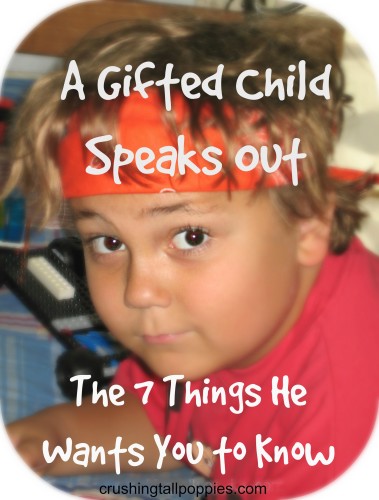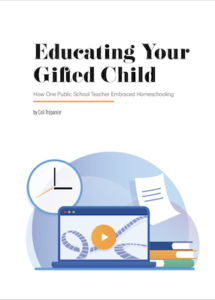Given the chance to advocate for himself, my gifted 14 year old sure had a lot to say about being gifted. As parents, mental health professionals and teachers of gifted children, we advocate, research, discuss and share about gifted children among ourselves, online and in person, but it seems we don’t often hear from the gifted children themselves about how they feel about being gifted. How do they really feel about being gifted? The good? The bad? The unacceptable? If given the chance, what would they want others to know about them and being gifted? What bothers them the most? What things would they want us to change?
I gave my son the iPad and let him have free reign. “What are the most important things you want everyone to know about how it feels to be gifted?” Here is a look at the 7 things a gifted child wants us to know and understand about how it feels to be gifted child today.
Testing and memorizing: Please don’t judge my knowledge based on how well I do on an objective test. Testing my knowledge based off of a test grade where I needed to memorize superficial, basic facts and then spit them right back out doesn’t work for me. I think gifted kids need you to do more interactive assessments where we can discuss or model our understanding of the information. Gifted kids can’t just take in information and then just spit it out at a moment’s notice. I don’t learn through memorizing various, random facts, and being judged on how well I can memorize those facts and provide the correct answers to you on an objective multiple-choice test. I need more in-depth discussions and lessons using scenarios. I need to get into more depth in the subject in order to learn. I need you to provide modeling of the information and give me a chance to visualize all the connections to the information. When I’m given multiple choice and true-and-false tests all the time, I just shut down.
Homework: When you give me homework on information I already know, I think to myself, “why would this benefit me?” Then I just don’t feel like wasting my time on it. I would rather dig deeper or go farther into the subject or move on and learn other things. Isn’t that why I am in school? I need to continue to learn. Plus, teachers don’t usually grade homework, so why would I bother? Teachers are just giving homework because in their mind, it is helping us and that is just because of how they are trained. Sometimes I think that it is just because they want to continue the torture at home, too. So, when kids are given homework, it is like teachers feel better just giving us more work, and kids will just go home and Google the answers anyway and not really learn anything. Why would I need to do this if I already know the information? Homework should be more meaningful and in depth or thoughtful. If you have to give out homework for practice, why can’t you only give it out to the kids who need the practice? I once asked a girl in my class who always made all A’s why she does her homework since she already knew all the information. She answered, “Why wouldn’t I? If the teacher assigns it, then I have to do it to keep making A’s!”
Challenging the teacher: Teachers should allow and accept differing opinions from us. Teachers should understand that I have opinions and ideas of my own and I may not agree with the teacher. If I tell you what I think and it does not agree with what you think, why should you get mad at me? I’m not being disrespectful or showing off, I just think a lot and I have lots of different ideas to share. We should be allowed and expected to think for ourselves and be able to share our thoughts without you getting mad at me. I had a teacher once who hated me for telling her when she misspelled or mispronounced a word. She took it out on me and bullied me until I had to leave the school.
Being different and not average: Just because gifted kids or any kids are different doesn’t mean we are wrong or bad. Just because we aren’t average, doesn’t mean we are bad. Gifted kids always seem to stand out and get singled out. It sure seems safer and better to be average and be like everybody else in school.
Making bad grades: If a gifted student is making bad grades or is not turning in his homework, don’t assume he doesn’t know the information or that he is just being lazy. Maybe you are not teaching or testing in a way that is best for the student. This happened to me, and my teachers kept telling me I just needed to work harder and do my homework.
Friends: Socializing in school just sucks because most often nobody seems to understand what I am talking about. It always seems to be over their head or they don’t understand what I’m talking about so I need explain it to them, and then I get called a know-it-all. It makes me misunderstood.
Bullying: Anybody who is different or who stands out will get bullied. Gifted kids are more likely to get bullied by other kids and even by their own teachers. Parents and teachers need to know this and teachers should watch to make sure the gifted kids in their classrooms are not being bullied.
I was not surprised by most things on his list given his negative experiences in our public schools, but I had not really considered how strongly school, education and learning had woven itself into a dominate force in his life, and in his living. As his mom, and now that we are homeschooling, I am glad he spoke out because I can now be very mindful of his learning needs as I guide his education. And I hope that his list provides you some insight into the thoughts and needs of a gifted child.
What things would your gifted child want you and others to know? What would she say if given the chance to advocate for herself?
Video: On Being Gifted: Common Questions and Misconceptions

 Crushing Tall Poppies
Crushing Tall Poppies




I am gifted. This made me cry because sometimes I feel so alone, I feel like no one understands what it’s like being me. People don’t understand that they can’t just leave me sitting in a classroom doing nothing because I finished my work. They don’t understand that I need more, that they can’t just leave me to myself and think I’ll be fine on my own. They don’t understand why I shut down when I’m stuck going in circles. I need more out of my education. I need to learn at my own pace. I don’t have very many real friends, I can’t communicate with other kids my age, they never understand what I’m talking about. They aren’t interested in the same things I am. I have one friend, he’s also gifted. Man, I’d be so lost without him. You think you’ve got me figured out, but to be honest, you probably don’t. Word’s can’t express how wrong it is to leave me here like this. I’M DONE BEING TREATED THIS WAY. I’M SICK OF FEELING ALONE. THIS NEEDS TO STOP, NOW!
My heart breaks into a million pieces and tears spring to my eyes when I read yet another young person cry out against the misunderstanding of who they are, who they were born to be such as you did. I feel your pain, but you are certainly not alone in your frustration, anger and sadness over your giftedness being misunderstood. I know, because the story of one of my gifted sons is almost identical to yours. It’s why I do my best to write and speak out. And I’ve heard from far too many young people who feel the same as you. Let’s see if there are some solutions you could try.
First, you need to speak to your parents or a trusted teacher or adult about your feelings of being misunderstood. Maybe together, you all could come up with a plan to advocate for you and to find a more appropriate education that will engage you and meet your needs. Sometimes, it takes a village.
Also, I had one young person write to me months ago with a story similar to yours and I suggested he start speaking out and he did. He’s now got a pretty big following on Twitter on Gifted Students Unite Check it out and reach out to him/her! This helps because it gives you the feeling that you are not just sitting back and letting the misunderstanding take over, but that you are doing something to change your life and the lives of other young people like yourself.
Lastly, would I have your permission to use your words to share on my Crushing Tall Poppies Facebook page–anonymously, of course? What you wrote and how you wrote it was so concise, so poignant that anyone reading it would be completely clear on the gravity of the problem when gifted kids are misunderstood. And with writing as great as yours, starting a blog or writing articles for local newspapers or gifted organizations would be a great way to let others know how much misunderstanding giftedness hurts. If you’d like, you are welcome to write a guest post for my blog explaining to my readers just how it feels to be misunderstood.
Let me know if I may use your words in your comment, and also consider writing a guest post for my website here. Please keep in touch and let me know if you have any other concerns or questions. <3
Your son has done a wonderful job of explaining what it means to be gifted, at least that is how my daughter would have explained it. This does not appear to be the case for all who are gifted. Out of 5 gifted children in her grade she was the only one who seemed to be experiencing the difficulties your son describes and I believe this was because she was the only one who was both gifted and a visual learner. Visual learners, in my opinion, and based on some research, are more emotionally mature, more sensitive and need a good relationship with their teacher in order to learn. Being a visual learner, while an amazing and effective way of learning, is not how the typical school system teaches, even though it would be preferred by about 60% of the population. Being a gifted visual learner, trying to learn in an auditory system, appears to me to be the cause of most of the problems in the classroom. These children are wonderful, sensitive, artistic and highly intelligent with a very natural curiosity and love of learning who could bring so much to the average classroom. What is unfortunate is that the average classroom does not seem to be able to provide these children with a safe and nurturing environment because they just don’t get gifted let alone gifted and visual. For these children, finding true peers could be even more difficult. While most gifted may find true peers with other gifted children, those who are both visual and gifted may have more difficulty finding others who are visual and gifted.
Sheila, You are absolutely right; many of these characteristics are indicative of visual-spatial learners! Not all gifted children learn in the same way and visual-spatial learners seem to need very specific teaching strategies in order to learn. Gifted children are as different from each other as all children are, but gifted children seem to be the only population of learners who are the most neglected and misunderstood in school. Visual-spatial learners are just twice-neglected! Thanks, Sheila 🙂
Words can’t describe gifted to it’s full extent. I’m sick of feeling alone.
I think you understand your kid really well. I was not surprised by any of these… Just from reading your blog. You have described your child yourself perfectly before. Your boy must fee very safe and understood with you. Good job mom. 🙂
Thanks, Southern Girl! I also know you have your child figured out very well and you are blazing trails for her! 🙂